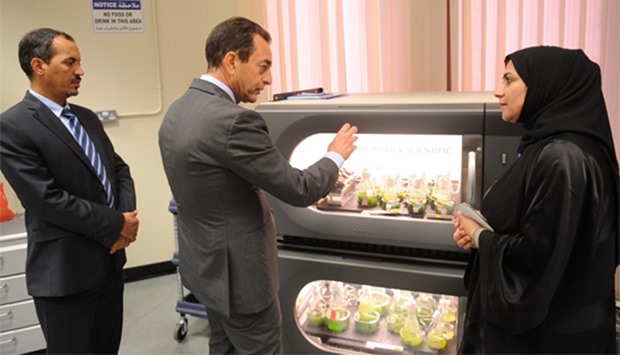Speaking on the sidelines of his visit to the algae plant in Al Khor last week, the envoy said he was impressed with the ATP after Qatari scientist Hareb al-Jabri presented the project at a conference held at Qatar University (QU).
“It (ATP) is looking at different possibilities from a natural resource here, from health to food safety, to also trying to use part of CO2 for positive purposes,” he noted. “It is very important that Qatar does not only appear as a country producing oil and gas but also taking care of sustainable development.”
The project started in 2009 with funding from Qatar Airways and Qatar Science and Technology Park. It collected more than 200 local microalgae and cyanobacteria species from various parts of the country.
The research team also started converting algae biomass to biodiesel, bioethanol and bio-crude oil as part of the experimental stage.
QU expects commercial algae production in Qatar for animal feed and biofuels (phase 4) to take place in 2025 using a 100 hectare lot.
Based on al-Jabri’s conclusion, the past five years have seen a strong increase in research and development activities on algae and QU’s research activities also showed promising results.
Chevallier said some French companies, research institutes and scientists from France are involved in the project particularly the Qatari Diar Vinci Construction (QDVC).
QDVC’s aim is to invest in certain applications leading to a CO2 capturing solution, according to research associate Kira Schipper from QU’s Centre for Sustainable Development, College of Arts and Sciences.
“For every kilogram of CO2 they emit, they are investing a certain amount of money which has something to do with research reducing the amount of CO2 by algae,” she said.
Since algae need CO2 and nutrients to grow, they can be used to capture CO2 from flue gas. They can also remove pollutants from waste water and produce useful products.
France’s keen interest in the research project is due to its commitment to sustainable development, Chevallier noted, adding that they organised Conference of the Parties (COP) 21 in December where a very important agreement to protect the environment was sealed.
He said French companies are also looking at many collaborations with Qatar on sustainable development including solar energy.
“We have also several companies who are working on the energy efficiency. France is known for being involved on wastewater treatment, these are also things that we are working on. It is a wide range of partnerships,” he added.
Chevallier said ATP is very interesting because it has a strong research component, which looks at the future to develop new applications.
The envoy also cited the importance of developing technologies not only on CO2 sequestration but also about producing nutrients for animals, fish and humans. “Some applications may be hopefully for cancer, so this is very broad.”

